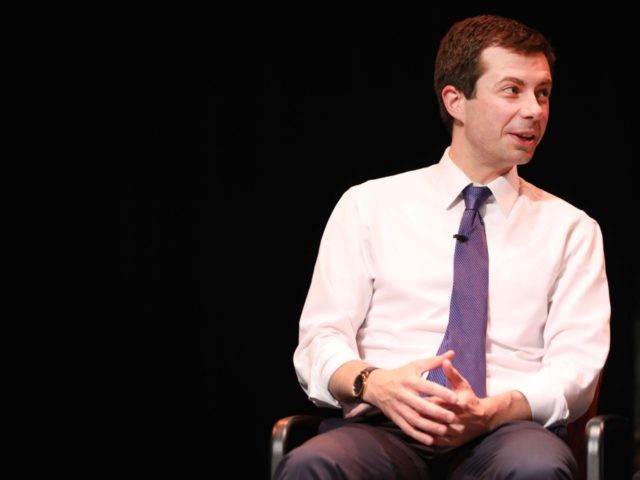On Thursday, Democratic presidential hopeful Pete Buttigieg spent much of the day regurgitating Barack Obama’s old, failed anti-Israel policies.
He told the Washington Post that he does not support Israel’s “right wing” — a comment that was almost verbatim the same thing then-Sen. Obama (D-IL) said on the campaign trail in 2008. Later that day, Mayor Pete told a meeting of left-wing Jews that the U.S. should pressure Israel to change its policies — whatever those were.
Obama — and then-Vice Pesident Joe Biden — tried that approach for eight years. First they tried ostracizing Israeli Prime Minister Benjamin Netanyahu. Then they insisted Israel freeze construction in settlements in Judea and Samaria (the “West Bank”); when Netanyahu complied, the Palestinians only hardened their demands and refused to negotiate.
Nevertheless, Obama attempted to create distance between the U.S. and Israel, with Biden even condemning the Israeli government for building apartments in a Jewish neighborhood of eastern Jerusalem. The Obama administration also funneled U.S. taxpayer money to left-wing activists in Israel in an effort to unseat Netanyahu in the 2015 elections. And Obama struck a nuclear deal with Iran, over Netanyahu’s protests, that placed Israel’s long-term security at risk. Not only was Israel weakened, but the U.S. was as well, as Obama showed he would not stand by America’s allies.
Buttigieg’s comments Thursday suggest that he learned nothing from Obama’s failures. They also invite questions about whether he has a deeper antipathy to Israel. In his columns for the Harvard Crimson a decade-and-a-half ago, Buttigieg suggested that Israel and Saudi Arabia were nations “who cause suffering,” and opposed the term “homicide bomber” to describe Hamas terrorists (a term some adopted to minimize empathy for the “suicide” of the terrorist).
But the truth about Buttigieg’s views on Israel is more complex. Last year, the mayor of South Bend, Indiana, visited Israel as part of a delegation of mayors organized by the American Jewish Committee. He returned with praise for the way that Israel handled the threat of terrorism, and he also criticized Hamas for causing Palestinian suffering in Gaza. Earlier this year, on The View, he rejected any moral equivalence between Israel and Iran in terms of human rights.
So what happened? Buttigieg’s pro-Israel comments attracted negative attention within the Democratic Party among anti-Israel activists who are increasingly in control of the party’s foreign policy agenda. A group of anti-Israel activists crashed his presidential campaign launch rally last month in South Bend, for example, telling Newsweek that “they hoped to nudge him on his foreign policy, particularly as it relates to Israel and its neighbors in the Middle East.”
A few days before that, Netanyahu — facing a tough re-election battle — promised to annex parts of the West Bank if he returned as Prime Minister. That prompted Buttigieg’s first public criticism of Netanyahu: “This provocation is harmful to Israeli, Palestinian, and American interests. Supporting Israel does not have to mean agreeing with Netanyahu‘s politics. I don’t. This calls for a president willing to counsel our ally against abandoning a two-state solution.”
But there are parts of Judea and Samaria that will certainly be part of Israel under any two-state solution. Buttigieg’s criticism was more opportunistic than substantive: he saw a chance to break publicly with the Israeli government.
The problem: Israelis went on to elect Netanyahu to a fifth term. Israel’s “political right wing” is the democratic choice of the Israeli people, and the government that the U.S. president will likely have to deal with for the next several years.
And so Buttigieg is attempting to have it both ways, to stake out a position that is both pro-Israel and anti-Netanyahu. It is a formula that failed for Obama. Worse, for Buttigieg, it will satisfy almost no one outside the left-wing J Street clique. Supporters of Israel feel attacking Israel’s democratically-elected leaders undermines the alliance. And anti-Israel activists within the Democratic party told Newsweek that Buttigieg’s criticism of Netanyahu is insufficient.
In a field of 23 candidates, one way for Buttigieg to stand out would be to support Israel without taking cheap shots at the Israeli government. But like the rest, he is running to the left — even courting the support of an antisemite like Al Sharpton.
He is repeating Obama’s mistakes — and, in so doing, proving that Democrats no longer tolerate pro-Israel views. Buttigieg’s “de-evolution” on Israel policy is a sign that pro-Israel voters really only have one choice in 2020.
Joel B. Pollak is Senior Editor-at-Large at Breitbart News. He is a winner of the 2018 Robert Novak Journalism Alumni Fellowship. He is also the co-author of How Trump Won: The Inside Story of a Revolution, which is available from Regnery. Follow him on Twitter at @joelpollak.

COMMENTS
Please let us know if you're having issues with commenting.